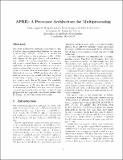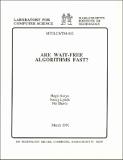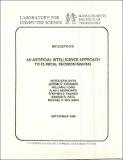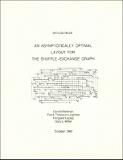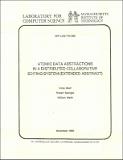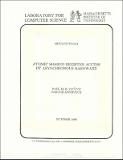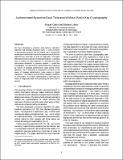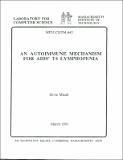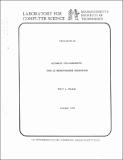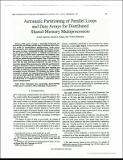Browsing LCS Technical Memos (1974 - 2003) by Title
Now showing items 21-40 of 492
-
APRIL: A Processor Architecture for Multiprocessing
(1991)Processors in large-scale multiprocessors must be able to tolerate large communication latencies and synchronization delays. This paper describes the architecture of a rapid-context-switching processor called APRIL with ... -
Are Wait-free Algorithms Fast?
(1991-03)The time complexity of wait-free algorithms in "normal" executions, where no failures occure and processes operate at approximately the same speed, is considered. A lower bound of log n on the time complexity of any wait-free ... -
Arithemtical Completeness in Logics of Programs
(1978-04)We consider the problem of designing arithmetically complete axiom systems for proving general properties of programs; 1.e. axiom systems which are complete over arithmetical universes, when all first-order formulae which ... -
Artificial Intelligence and Clinical Problem Solving
(1979-09)An ambitious, but intriguing, possibility for radically increasing the availability and adequacy of health case, while containing cost, is to use the computer as a consultant to augment and extend the skills of all health ... -
An Artificial Intelligence Approach to Clinical Decision Making
(1986-09)This memo is the text of a proposal from the MIT Laboratory for Computer Science Clinical Decision Making group to the National Library of Medicine, requesting support for a five-year program of research. -
An Asymptotically Optimal Layout for the Shuffle-exchange Graph
(1982-10)The shuffle-exchange graph is one of the best structures known for parallel computation. Among other things, a shuffle-exchange computer can be used to compute discrete Fourier transforms, multiply matrices, evaluate ... -
An Asynchronous Logic Array
(1975-05)A new asynchronous logic array for the general synthesis of asynchronous digital circuits is presented. The parallel and asynchronous nature of the array gives the realized systems the speed and characteristics of hardwired ... -
Atomic Data Abstractions in a Distributed Collaborative Editing System (Extended Abstract)
(1985-11)This paper describes our experience implementing CES, a distributed Collaborative Editing System written in Argus, a language that includes facilities for managing long-lived distributed data. Argus provides atomic actions, ... -
Atomic Shared Register Access by Asynchronous Harward
(1986-10)The contribution of this paper is two-fold. First, we describe two ways to construct multivalued atomic n-writer n-reader registers. The first solution uses atomic 1-write 1-reader registers and unbounded tags. The other ... -
Atomic Snapshots of Shared Memory
(1990-05) -
Authenticated Byzantine Fault Tolerance Without Public-Key Cryptography
(1999-06)We have developed a practical state-machine replication algorithm that tolerates Byzantine faults: it works correctly in asynchronous systems like the Internet and it incorporates several optimizations that improve the ... -
An Autoimmune Mechanism for AIDS' T4 Lymphopenia
(1991-03)We put forward a new model for the T4 lymphopenia occuring in AIDS by suggesting a mechanism whose net effect is blocking the generation of T4 cells during HIV infection. -
An Autoimmune Mechanism for AIDS' T4 Lymphopenia
(1991-04)We put forward a new model for the T4 lymphopenia occuring in AIDS by suggesting a mechanism whose net effect is blocking the generation of T4 cells during HIV infection. Supporting evidence for this mechanism is derived ... -
An Autoimmune Mechanism for AIDS' T4 Lymphopenia
(1991-05)We put forward a new model for the T4 lymphopenia occuring in AIDS by suggesting a mechanism whose net effect is blocking the generation of T4 cells during HIV infection. Supporting evidence for this mechanism is derived ... -
Automatic Code-generation from an Object-machine Description
(1970-10)This memo outlines the basic elements of a macro code-generating system, and develops an informal machine-independent model of a code generator. Then the memo discusses how an implementation of this model could be set up ... -
Automatic Design of Data Processing Systems
(1976-02)The design of data organization and data accessing procedures for data processing systems operating on large keyed fields of data is a common and recurrent activity in modern data processing applications. A considerable ... -
Automatic Partitioning of Parallel Loops and Data Arrays for Distributed Shared-memory Multiprocessors
(1995-09)This paper presents a theoretical framework for automatically partitioning parallel loops to minimize cache coherency traffic on shared-memory multiprocessors. While several previous papers have looked at hyperplane ... -
Automatic Partitioning of Parallel Loops for Cache-coherent Multiprocessors
(1992-12)This paper presents a theoretical framework for automatically partitioning parallel loops to minimize cache coherency traffic on shared-memory multiprocessors. The framework introduces the notion of uniformly intersecting ... -
Availability Study of Dynamic Voting Algorithms
(2000-11)Fault tolerant distributed systems often select a primary component to allow a subset of the processes to function when failures occur. The dynamic voting paradigm defines rules for selecting the primary component adaptively: ... -
Axiomatic Definitions of Programming Languages: A Theoretical Assessment
(1980-04)A precise definition is given of how partial correctness or termination assertions serve to define the semantics of classees of program schemes. Assertions involving only formulas of first order predicate calculus are ...
